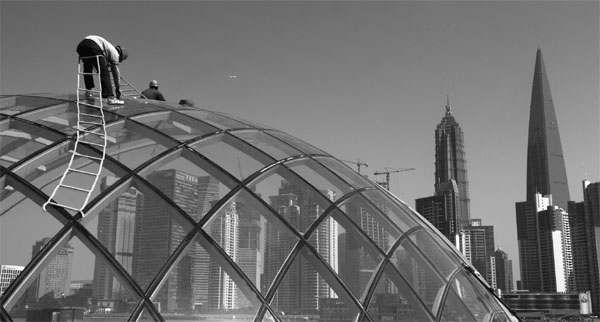High quality of city's economy noted
More reforms needed in FTZ, along with participation in Silk Road plan
Shanghai's economic growth is of higher quality than the national average and will face mounting pressure in 2015, but will be above 7 percent if problems and risks are well managed through reforms.
Those are among the highlights of an annual report published last week by the Shanghai municipal government's development research center.
The report cited the need by the city to further deepen reforms of the first free trade zone in its territory, actively participate in national projects like the construction of the Silk Road Economic Belt, the 21st Century Maritime Silk Road and the Yangtze River Economic Belt, promote development of emerging industries, innovation and service sectors through cutting tax and red tape, and take actions to stabilize its housing market.
Shanghai faces great pressure from government debt, the risks of bubbles in the real estate market and the shadow banking system, but Shanghai does not have industries with serious overcapacity, the report said.
Other highlights of the report include:
The main challenges for economic development for other parts of China are difficulty in financing and environmental limits. For Shanghai, the challenges are in the safe operation of the huge city, and the main obstacles for development are institutional, which run counter to the basic laws of a market economy.
The city relies more on innovation than investment to boost economic growth.
In the past two years, Shanghai's economy increased by 7 to 8 percent, similar to the national average, while investment in Shanghai grew by 3 to 5 percent, much lower than the 15 percent national average, the report said.
Compared with the national "new normal", a term used by President Xi Jinping to describe new characteristics of the Chinese economy, Shanghai's "new normal" has its own characteristics.
Shanghai's service sector has developed by 4 percentage points since 2011, faster than the manufacturing industries, and more than the national average of 1 percentage point.
The city's main service sector includes finance, trade and businesses, and traditional service industries like sales and catering at the national level.
The convergence of new industries, new models, new conditions and new technologies is more obvious in Shanghai.
The city's economic growth comes without any increase in construction. At the national level, a big increase in construction remains a foundation for economic growth.
|
A construction site near the Huangpu River in Shanghai. The city's economy is predicted to grow by more than 7 percent in 2015, if some problems and risks are properly managed through reforms. Gao Erqiang / China Daily |

























